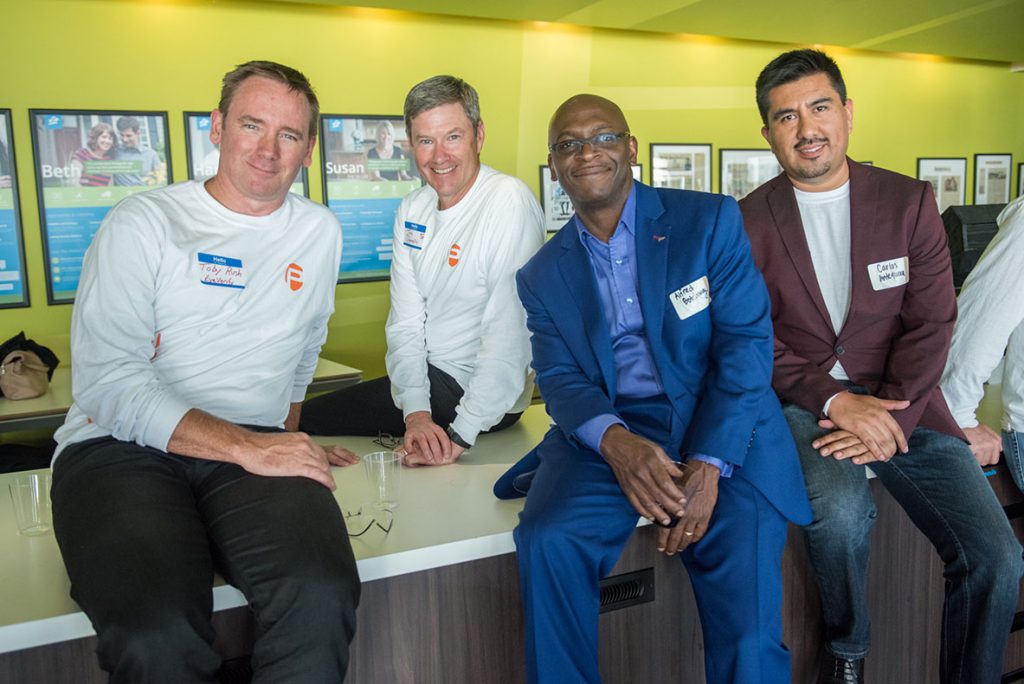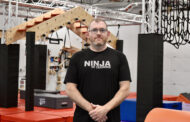Deals like the acquisition of KC-based SoftVu by an Alabama private equity firm don’t happen overnight. And founder Tim Donnelly gives near-equal weight to the trials and triumphs that led the marketing platform to its big exit.
“We’ve done as much as we possibly can based on the mistakes we’ve made, the lessons that have been so pivotal over the past 18 years,” said Donnelly, who remains CEO as part of the deal with New Capital Partners.
News of the acquisition, which puts SoftVu within NCP’s portfolio company, LoyaltyExpress, was made official this week. Financial details of the arrangement remain undisclosed, though Donnelly said it allows his team to invest more resources into a sister company, SeniorVu, which is not part of the transaction.
“Our desire to provide even higher levels of value and expand our marketing innovations to our [SoftVu] clients is in perfect alignment with LoyaltyExpress’ mission and NCP’s investment strategy,” Donnelly said.
SoftVu, a Software-as-a-Service marketing automation platform founded in 1999, leverages big data, machine-learning algorithms and sophisticated A-B testing techniques to enable clients in the mortgage banking industry to deliver marketing messages via email, text, direct mail, retargeting and video.
LoyaltyExpress focuses on CRM and marketing automation for banks and mortgage companies, while its parent NCP invests in niche, tech-enabled services companies in the healthcare, financial and business services industries.
“I knew that at some point we were going to hit a ceiling as far as optimizing our value because we simply don’t have the resources to take it further,” Donnelly said. “I don’t have the capital to say, “OK. We’re going to be a CRM now. We’re going to take on SalesForce.’ At some point, we had to find a capital partner. And before we made the commitment, I knew we had to do something else to be innovative, to be considered sexy.”
The answer was Donnelly’s new company, SeniorVu — but before it could become reality, SoftVu would take shape through a series of missteps and miracles, he said.

Pipeline entrepreneurs Toby Rush, Tim Donnelly, Alfred Botchway and Carlos Antequera
Mistakes lend a learning advantage
A high-profile Pipeline entrepreneur, Donnelly cites fellow heavyweights Toby Rush and Jason Tatge as examples of innovators who took what could be characterized as misfires and turned them into opportunities for new ventures.
Rush’s Rush Tracking Systems was a precursor to KC startup standout EyeVerify (now Zoloz), which was acquired by Alibaba affiliate Ant Financial for more than $100 million. Tatge’s Farms Technology preceded the founding of Farmobile, which has raised millions in its move for global expansion.
“Each of us will tell you, ‘Hey, we’ve made some mistakes. And next go-round, we’re going to do that much better,’” Donnelly said. “Nobody’s perfect, but those who figure out a way to take advantage of their mistakes eventually succeed.”
So what did SoftVu initially do wrong?
“If there are mistakes I’ve made as an entrepreneur through the SoftVu side, it’s in not making sure I had a management team that would help me start something new, rather than me just trying to figure this stuff out on my own,” Donnelly said.
While he had the support of fellow Pipeline entrepreneurs and others in the business community, Donnelly wasn’t able to think big enough in the beginning, he said, because he was too narrowly focused and stretched too thin.
SoftVu put its emphasis on the mortgage industry — where it found success, but had been beaten to the punch by competitors who already dominated certain aspects of the field.
“You want to find a market that’s exploding — where you can provide from soup to nuts in a one-stop shop,” Donnelly said, noting that SeniorVu is poised to do just that thanks to its predecessor. “What we built over the past 15-plus years on mortgage, we can use that technology and expertise to deliver value to this industry that is growing exponentially and — to put a little cherry on top — let’s add some patents.”
And that’s Mistake No. 2: While SeniorVu already has three patents, SoftVu had none, Donnelly said.
No. 3? Not making the company more appealing to firms like New Capital Partners sooner, he said.
“It’s a blessing and a challenge, but for 15-plus years we relied on angel investors — like most startup entrepreneurs — as our capital partners,” he said. “At some point, you really have to bring in that big checkbook. Not having that in our early days really limited our exponential growth opportunities.”
Inspiration, pivot, survival, rebirth
Despite such setbacks or delays, SoftVu’s acquisition remains the culmination of four key turning points for Donnelly, as well as the company, he said.
It began in the late 1990s, when — at about the same time an IT consulting firm where Donnelly worked exited to Xerox — a college buddy who went to Harvard, then Silicon Valley, took a company public.
Witnessing the move was his first big “Ah-ha!” moment, Donnelly said.
“My wife and I had a little nest egg, and being so close to somebody who’d just had phenomenal success in Silicon Valley inspired me to take a leap of faith,” he said.
That leap resulted in founding SoftVu in November 1999. A few years later, a single client brought the next big revelation, Donnelly said.
“As any entrepreneur experiences in the first few years, you pivot, pivot, pivot … and we hit a pivot in 2002 when somebody introduced us to a guy who was starting a mortgage company and he was getting all of his leads from a company called Lending Tree,” Donnelly explained. “That was interesting because we had been building a video messaging platform and he saw that as an opportunity to differentiate himself within the mortgage industry — to send a video welcome message to a lead that he acquired from Lending Tree.”
The client ultimately sold his company to Capital One in 2004, and was given an innovation award from Lending Tree, Donnelly said. When the client was asked about the technology that won him the award, he told them it was SoftVu.
“I started getting a bunch of phone calls the next week from all these banks who were at the awards. I’m like, ‘Well, how did you find out about us?’” Donnelly said. “That was a catalytic, big, big moment for us.”
Shifting to a niche market came with its ups and downs, he admitted.
“As things go, in 2007, 2008, 2009, something happened … We were a technology company that was serving the mortgage industry during the financial crisis,” Donnelly said. “If you’ve ever been stress-tested as an entrepreneur, one could argue that in the past 20, 30 or even 50 years, there’s never been a more stressful time in the world — financially speaking — than that period of time. And we were at the heart of it.”
The founder vowed to buckle down, he said, and pledged to focus on providing value to SoftVu’s clients — those who would survive the massive economic downturn anyway.
“We said, ‘Look, we’re going to try to help out as many people as possible. If you can’t pay us, you can’t pay us,’” Donnelly said. “That mindset got us through that period of time, and the clients we have today are incredibly loyal and they’ve graciously allowed us to continue to serve them.”
Ten years since the culminating point of the financial crisis, Donnelly recalls an emergency meeting of Pipeline entrepreneurs and fellows that proved critical to SoftVu’s own survival. He had just graduated from Pipeline’s 2007 charter class when alarm bells rang at the July 21, 2008, closed-door gathering.
“One of the advisers said, ‘If you have access to a line of credit, pull it — pull the whole thing down,’” Donnelly said. “We had a million-dollar SBA loan that had been approved the year before, and we had access to a small portion of it. This guy convinced me the next day to pull down $830,000 and start paying interest on it. I’m like, ’That’s crazy.’”
The SoftVu leader was warned the money likely wouldn’t be available if he waited another 30 days, he said.
“Lo and behold, we all know what happened,” Donnelly said. “If it wasn’t for Pipeline, I wouldn’t be here.”
The tip allowed SoftVu to soldier on, improving its platform through the years — but ultimately hitting the ceiling Donnelly described. The company needed a big enough chunk of a market to provide the potential for more than a billion dollars, he said.
Mortgage banking wasn’t the answer, Donnelly admitted, but he found another option in an unlikely place … Tampa, Florida.
Fresh ideas for an aging market
A trip to a trade show in the Sunshine State shone light on an opportunity too good to pass up: the senior living industry.
“As the youngest of six, I’ve seen both parents go through the aging process,” Donnelly said. “Both are now deceased, but my dad had Alzheimer’s. My mom had COPD. Both had that journey where the family crisis happened and we had to figure out what to do. As a family member trying to find solutions, this industry has a lot to learn.”
With an obvious void exposed, a company like SeniorVu could fill the space like SoftVu hadn’t, he said. As his idea matured, SeniorVu developed as a CRM, a lead source like Lending Tree, marketing automation as with SoftVu, and a call center concierge service known as the family advocate management team or FAM Team.
“Add all those things together and you have the billion dollars-plus opportunity,” Donnelly said.
The equation wouldn’t work, however, without SeniorVu CEO Tom Goldman, he said. A veteran of numerous companies in Austin, Texas, Goldman sat on SoftVu’s board, and was Donnelly’s former boss at the IT consulting firm that sold to Xerox, he said.
Both SeniorVu’s founding and SoftVu’s acquisition depended heavily on Goldman’s guidance as a mentor, older brother and advisor through the process, Donnelly said.
Now the companies are poised to deliver a new success story, he added.
“As we scale SeniorVu, we have a capital partner — that’s half the battle. We don’t have to do a thousand pitches! We’ve got the partner,” Donnelly said. “I don’t want to say I’m on Cloud 9 right now, but I’m happy and proud to be in the situation we are. And it’s because of our team and how they’ve focused on delivering value to our clients.”






































